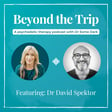
Sarah Pant: Psychotherapy approaches in Psychedelic Therapy
In this episode I will be talking to Sarah Pant, a fellow psychedelic-assisted psychotherapist. We discuss - The importance of psychotherapy techniques in psychedelic-assisted psychotherapy, the sacredness of therapy, how vital human connection is for healing, therapeutic approaches used in preparation, dosing and integration, the wider cultural context of psychedelics and Indigenous practices, longer-term integration groups and the challenges of the dominant medical model of distress.
Sarah is a Clinical Psychotherapist with nearly 20 years of experience in mental health across Australia and the UK. At Monash University’s Clinical Psychedelic Lab, she was a core therapist and trainer in the world’s first trial looking at Psilocybin assisted psychotherapy for Generalised Anxiety trial and now serves as a clinical supervisor and therapist on the trial exploring MDMA -assisted psychotherapy for PTSD.
Sarah’s therapeutic approach weaves together somatic practices, creative arts, ecopsychotherapy, systems thinking, and process-oriented psychology. Her holistic perspective of health and well-being is deeply rooted in fostering human connection, exploring altered states of consciousness, enhancing our connection with the living world and navigating the unique challenges of our time.
Stay in touch with me at
insta: dresmedark
website: https://www.esmedarkpsychology.com.au/
Fiind Sarah at:- https://beingfound.com.au/psychedelic-integration
find Monash Clinical Psychedelic Lab at - www.monash.edu/psychedelics
Book recommendations
https://www.goodreads.com/book/show/53121631-underland
https://www.aamindell.net/books-by-amy-and-arnold
https://www.goodreads.com/book/show/55384168-no-bad-parts?ac=1&from_search=true&qid=hM0AaWUrgS&rank=1
This podcast is for general information only and does not constitute an endorsement or recommendation for psychedelic-assisted psychotherapy.
















